| |
Scrubbaloe Caine
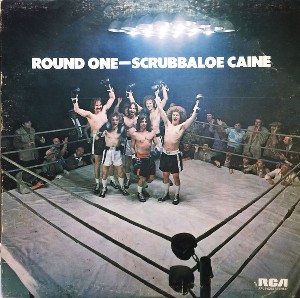
Round One
RCA - 1973
Mike Milner
|
One of the more entertaining groups that hailed from Canada during the early 1970s was an eclectic band of musicians who called themselves Scrubbaloe Caine. They arrived at a time when the Canadian pop music scene was experiencing a great deal of growth and the Canadian music industry was entering what has since been referred to as its Golden Age. Despite the promise the band seemed to have, they only recorded one album before breaking up. Since their unfortunate demise, Scrubbaloe Caine has been thought of more as a footnote, especially since some of its members would go on to bigger and better things. This is not just unfair; it is flat-out wrong. Round One is a prime example of an excellent debut recording from a killer band.
The version of Scrubbaloe Caine that recorded Round One was a sextet from Western Canada, primarily Calgary, consisting of Al Foreman (keyboards, harmonica and lead vocals), Henry Small (violin and lead vocals), Paul Dean (lead guitar), Jim Harmata (lead guitar), Bill McBeth (drums, percussion and vocals) and Jim Kale (bass and vocals). Kale, who had previously performed with the Guess Who, replaced original bassist Bob Kidd.
I recently spoke to Henry Small about the band, asking him about his recollections of those heady days. Small grew up in the community of Beacon in New York State and relocated to Canada around 1969, joining a popular group in Calgary called the Gainsborough Gallery. Shortly thereafter, he and Dean started Cannonball, which then turned into Scrubbaloe Caine. Small points out that there was no real significance to the band's name; like many other musical groups, the members were just kidding around and created it. They were very tight, both musically and personally. The boys spent a lot of time together and the music they created was a collective effort, with each bringing his particular talents to the arrangements.
Foreman was the main songwriter. He would bring songs in that he was working on and the rest of the band would pitch in. Small handled most of the vocals, although Foreman would often add a harmony line. As well, Dean and Harmata had a ripping twin guitar sound. During my conversation with Small, I remarked how Scrubbaloe Caine enjoyed quite the reputation as a live act. He agreed wholeheartedly, saying the group had wonderful chemistry on stage. He told me that in their formative years, they had an extended stay at a club in Quebec City called the Electric Circle, playing up to six sets a night several nights a week for seven months. Spending all that time at the Electric Circle really brought the group together, both on and off stage. In fact, Small considers them "the most exciting live act I ever played with". He recalled the time they opened for the Guess Who at the Canadian National Exhibition in Toronto as an example of the band's prowess on stage and how that translated into an enthusiastic response from the audience.
Around the same time that Kale joined the band, Don Hunter became their manager. Hunter had a strong presence in the Canadian music scene at the time as the manager of the Guess Who. The next step was for Scrubbaloe Caine to sign a deal with a record label and get into the recording studio. They had interest from several labels, but they settled on RCA, the same record label that the Guess Who recorded for.
Scrubbaloe Caine headed off to Los Angeles to record Round One in the summer of 1973. The producer was David Kershenbaum, who would go on to have a very successful career in the music business, producing such artists as Joan Baez, Tracy Chapman, Bryan Adams, Joe Jackson and Duran Duran. I reached out to Kershenbaum to ask him what his recollection was of the session. He very generously replied, indicating that he did recall the group and loved them. However, with the passage of time, and with all the other artists he had worked with and the music he had been involved in over the years, he couldn't recall many details. Small had mixed feelings about the sessions, feeling that the finished product really didn't reflect the musical capabilities of the group. While the songs themselves were excellent, he felt the amount of time available for the recording - the whole project was completed in less than a week - didn't allow for the band to perform at the level of musicianship they were capable of.
Round One was released during the latter part of the summer in 1973. It is a classic example of a group of up-and-coming young musicians ready to show the listening public what they were capable of. Scrubbaloe Caine had paid their dues with years on the road, playing night after night, and honing their musical skills and developing their sound. The cohesiveness of the band leaps out of the record's grooves. Not only do they have that tightness that comes from countless hours of playing and rehearsing together, the songs on Round One display the musical intuitiveness that musicians develop when they are used to performing together.
Two tracks on Round One are especially notable: their cover of 'Trouble', written by Lieber and Stoller and performed by Elvis Presley in the movie King Creole, and the Al Foreman ballad 'Travelin''. The decision to cover 'Trouble' was an inspired one. Small recalled that it came about after the group was jamming one time over the old blues riff that is used to open the song. This number plays to the band's strengths particularly well. Small delivers a strong vocal and the twin guitar stylings really work well. We also get to hear some stirring harmonica playing from Foreman. The rhythm section lays down a cool groove and just propels the other musicians forward, holding everything in place. One of my favourite parts of the tune is the tempo change about halfway through. The band pulls this off brilliantly, and it really adds to the excitement the song generates.
'Travelin' is a wonderful ballad played with a gospel feel. The lyrics are thoughtful and sincere, and reflect the age-old emotional challenge facing a couple in which one of the partners tries to explain why he (or she) has to follow their dreams and travel, with the other partner imploring them to settle down, and not understanding why they won't...very apropos I suppose for young men in a musical group out on the road seeking fame and fortune. The song opens with a soulful vocal by Small, with just piano accompaniment for the first half of the first verse, and then Jim Kale joins in with a bass figure for the next two lines. The rest of the band then subtly enters at the commencement of the second verse. We get another tremendous guitar solo and then some inspired vocal call and response between Small and the others for the song's finale.
Unfortunately, the emotional letdown the guys felt after the recording sessions for Round One really caused a rift in the band, according to Small. This was the beginning of the end for Scrubbaloe Caine, and led to the group's eventual dissolution. To be fair, there were other factors as well. For one, Foreman wanted to spend less time on the road and instead pursue a career as a songwriter. All that being said, however, Small still has fond memories of his time with Scrubbaloe Caine.
Round One achieved moderate success, appearing in the RPM Hot 100 Albums chart, while Scrubbaloe Caine was nominated for a Juno Award for Most Promising Group the following year. Nevertheless, the album has not made the transition to compact disc, nor is it available for download on iTunes. Not to worry, though, as used vinyl copies are fairly easy to find and sealed versions do occasionally come up for sale.
|
|
Suggestions
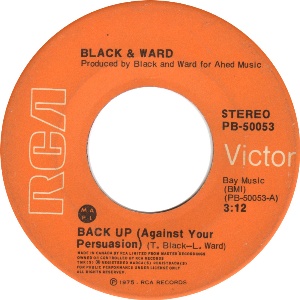
Black & Ward
Back Up (Against Your Persuasion) / This Is My Confusion - 7"
RCA
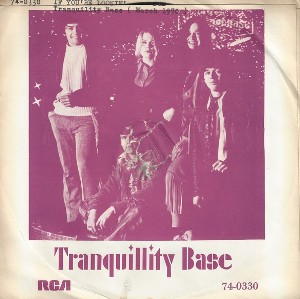
Tranquillity Base
If You're Lookin' / Fun - 7"
RCA
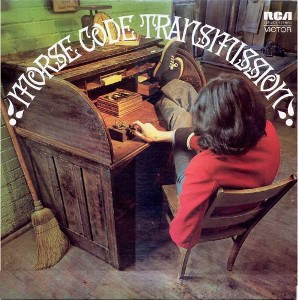
Morse Code Transmission
Morse Code Transmission
RCA
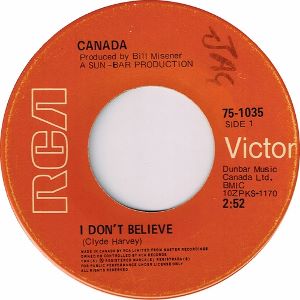
Canada
I Don't Believe / Coochy Coo - 7"
RCA
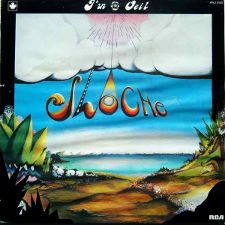
Sloche
J'un Oeil
RCA
|








